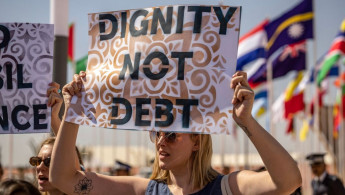In Marrakech, MENA activists call out IMF's 'tone-deaf' policy
On the sidelines of the World Bank-IMF meeting in Marrakech, activists gathered to call out the monetary organisations' tone-deaf and gender-blind systems.
"The IMF is the villain in this series of negotiations. We are talking about a crisis deeper than a policy crisis. (..) We are here to advocate for change of the global economy to become green and feminist," said Shereen Talaat, a member of the MENAFEM movement, at the panel of the Arab Reform Initiative (ARI) held in Marrakech on Tuesday, 10 October.
On 9 October, the International Monetary Fund (IMF) and World Bank launched their week-long annual meetings in Africa for the first time in 50 years as they face a growing chorus of criticism that their policies impoverish further struggling classes in the indebted countries.
"We will not pay subsidies for rich people," said IMF Managing Director Kristalina Georgieva in an answer on the Tunisia-loan hiatus amid President Kais Saied's refusal of IMF's conditions during Monday's session.
For Imene Sherif, a member of the Friedrich-Ebert-Stiftung organisation, this statement proves the monetary organisation's lack of local lenses and tone-deaf policies.
"The majority of the beneficiaries from the subsidies in Tunisia are the middle class: 60% middle class and only 9% rich families from the subsidies, and let's keep in mind that the middle class in Tunisia is a struggling class," she said
"We are talking about a country where the minimum wage is US$150," added Sherif.
Under the theme of "the impact of International Financial institutions on social protection in the Arab Region," several economists and activists from the SWANA region joined the ARI panel to discuss the effects of IMF's loans on the region and alternative solutions to fix the damage.
Tunisia was a present example of the IMF's problematic policies.
Tunisian authorities and IMF leaders agreed on a bailout loan in October 2022, but Saied, ruling by decree since July 2021, refused to sign the deal, saying that "foreign diktats" would lead to more poverty.
While Saied's populism and "facade socialism" remain a hot topic of criticism, his decision was endorsed by several experts who argue that the bailout package will not provide long-term assurances for Tunisia's economy and will exacerbate inequalities.
According to Egyptian activist Shereen Talaat, the IMF's conditions for loans have increased poverty and unemployment in indebted countries, leading them to a vicious circle of loans. The total population in the countries affected by these programs is more than one billion people, according to Human Rights Watch (HRW)
On the bright side, the IMF has finally reflected on its hurtful austerity loan conditions on social protection in indebted countries and launched a social spending floor program to invest in recoveries after the COVID-19 pandemic.
However, a report by Human Rights Watch has described this program as a "bandage on a bullet wound" as it remains hollow, unspecific and nonchalant about human rights.
Nevertheless, economists and activists continue to share alternative solutions with the monetary institution yearly despite the IMF's "avoidance" policy.
The most progressive solution for Isabelle Ortiz, a representative of the Initiative for Policy Dialogue, is "Taxing the Rich". But under the current economic system, that is nearly impossible, says the expert.
"Do we need an alternative organisation instead of IMF? Probably. But powerful countries like the US will sabotage that. All we have now is keep pressuring the IMF to listen," Ortiz told The New Arab at Tuesday's panel.





 Follow the Middle East's top stories in English at The New Arab on Google News
Follow the Middle East's top stories in English at The New Arab on Google News


